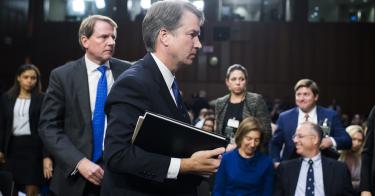September 20 — that’s when the Senate Judiciary Committee will likely vote on Judge Brett Kavanaugh’s Supreme Court nomination. While only one name will be up for consideration, it will appear as though two different nominees are under discussion.
That’s because most Democrats planned from the start to vote against President Trump’s nominee, no matter who it was. And when the actual nominee turned out to be so well-qualified and widely respected, they had to create a fictional nominee to oppose.
This fictional Kavanaugh, according to Senator Dianne Feinstein (D., Calif.), “believes this president cannot be investigated, cannot be tried.”
The real Kavanaugh has never suggested any such thing. He gave a speech in 2008 — nearly a decade before “this president” was elected — suggesting that Congress consider delaying any prosecution or civil suit against any sitting president until after he or she leaves office. As Kavanaugh explained at his confirmation hearing, he was talking about timing, not immunity. “The point,” he said in that 2008 speech, “is not to put the president above the law or to eliminate checks on the president.” What part of the word “not” in that sentence do Democrats not understand?
The fictional Kavanaugh whom Democrats oppose rejects the Supreme Court’s decision in United States v. Nixon, which forced President Richard Nixon to turn over tapes about the Watergate break-in. Senate minority leader Chuck Schumer (D., N.Y.) said: “If Kavanaugh would’ve let Nixon off the hook, what is he willing to do for President Trump?”
The real Kavanaugh, both before and after he became a federal judge, has written that United States v. Nixonwas one of the Supreme Court’s most important decisions. In 1998, he wrote that it “reflects the proper balance of the president’s need for confidentiality and the government’s interest in obtaining all relevant evidence for criminal proceedings.” In 2014, he called the decision one of the “most significant cases in which the judiciary stood up to the president.” And in a 2016 speech, Kavanaugh called this precedent one of the “greatest moments in American judicial history.” Democrats’ fictional tale about Kavanaugh on this issue requires believing that the word reject means embrace.
The fictional Kavanaugh whom Democrats oppose is a cypher whose years of service in the executive branch remain shrouded in mystery. On September 4, Senator Richard Blumenthal (D., Conn.) made a motion to adjourn the confirmation hearing “so we can access the documents we need.” But 57 days earlier, Blumenthal said he would vote against the nomination “because of Judge Kavanaugh’s record and writings — which I have reviewed.”
Similarly, Senator Kamala Harris (D., Calif.) asked that the hearing be postponed so she could review the latest batch of documents related to Kavanaugh’s service in the executive branch. Yet Harris said she opposed Kavanaugh on June 27, twelve days before anyone knew he would be nominated.
The real Kavanaugh was nominated to the U.S. Court of Appeals in 2003 and had not one, but two, confirmation hearings before his appointment three years later. In twelve years on the appeals court, he wrote or joined nearly 700 opinions — which both Leahy and Schumer have said is the best information for evaluating a Supreme Court nominee.
In addition to that lengthy paper trail, Kavanaugh provided 17,000 pages of his speeches, articles, and teaching materials when he submitted his Judiciary Committee questionnaire in mid July. As of August 21 — two weeks before the hearing began — the Judiciary Committee had posted to its website more than 267,000 pages of material related to Kavanaugh’s record. The committee and the public have more information about the real Kavanaugh’s record than about any previous Supreme Court nominee.
Rather than make up a fake nominee to vote against, Senate Democrats should make the case for opposing the real Kavanaugh . . . if they can. They should explain to the American people why judges should promote a political agenda or decide, before knowing all the facts, which parties will win their case. They should justify why five members of the Supreme Court should be able to control what the Constitution and statutes mean.
They oppose the real Kavanaugh for only one reason: that he will not be that kind of political judge.
This piece originally appeared in the National Review



